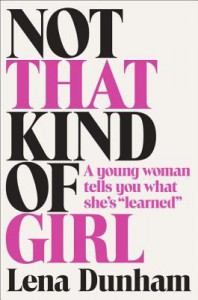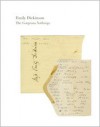Currently reading
Saints in Art
The Gorgeous Nothings: Emily Dickinson's Envelope Poems
Selected Poems
Emily Dickinson
Lies My Teacher Told Me : Everything Your American History Textbook Got Wrong
Gone with the Wind
Not That Kind of Girl: A Young Woman Tells You What She's "Learned"
 If you read the comments on negative reviews here on Goodreads, these are some recurring themes you'll run into:
If you read the comments on negative reviews here on Goodreads, these are some recurring themes you'll run into:"You didn't read this whole entire book, so you're not allowed to rate or review it."
"Some reviewers are obviously just looking for an excuse to trash books."
"If you don't like a book, why go on and on about it? Put it down and get on with your life, already. Think about the things you could have done in time you spent writing this review."
"Clearly you're just a very negative person."
"I loved it. Clearly we didn't read the same book."
"Why did you read a book you don't even like?"
The fact that the last question on that list directly contradicts the first is a clue to what's going on here.
What's going on here is that some readers are treating books they love like sacred texts.
A friend of mine once got in touch with another friend he hadn't seen in a while. She was now devoutly religious, and urged him to convert to her faith. She was happier than she'd ever been, she said, and she wanted him to be happy, too. She gave him a copy of what was now her holy book. "Please, read this," she said. "Then you'll understand."
He read it. He still didn't want to convert to her religion.
"Why not?" she asked.
He attempted to engage her in conversation, to discuss issues the book in question had brought up for him. He wanted to hear her opinions, to see how she would answer his questions. She was confused and dismayed.
"That's not how you're supposed to read it," she said. "You're not supposed to pick it apart like that. You're supposed to read it with your heart."
It doesn't matter which holy book I'm talking about. Everyone who's read any of the livelier comment sections of any of the negative reviews on Goodreads knows that in terms of the attitude I just described, I could be talking about Jane Austen or Jane Eyre or the latest YA bestseller. People who love these works are sometimes not content with loving the books they love. They have to convert the heretics who are refusing to bow to the greatness that stands before them.
I read this book because I saw people being trashed for disliking it solely because of some understandably infamous passages – quotes that got around so widely that even people who can't remember Lena Dunham's name know some things she claims to have done to her younger sister.
"You're taking those quotes out of context," commenters insisted. "You can't judge this book unless you've read it."
The short answer: Fine. I read the book. I saw some very good writing. I also saw some very repulsive writing. And those infamous quotes are, to me, every bit as creepy in context as out of it.
The longer, more important answer: You didn't really mean that you thought the reviewers in question should at least read this book before commenting on it. You meant that you wanted them to read this book, experience a Saul-on-the-road-to-Damascus blinded-by-the-light conversion, fall off their high horses, and sing Lena Dunham's praises in exactly the same key you do.
I watched some clips from Girls. I'm planning to see Dunham's film Tiny Furniture, because it looks wonderfully bizarre. I understand that Lena Dunham is an extremely talented writer, actor, producer, and director.
I still don't like this book, and yes those quotes are still way creepy.
...
Those dots stand for the time it took me to get up and check how many separate copies of Pride and Prejudice I currently own.
I counted 7. I may not have caught them all.
That's too many even for someone who's researching Regency England with an eye to setting a novel there (which I am).
I have an entire set of shelves dedicated to books by and about Austen. Not a shelf: an entire bookcase.
Clearly it's time to call the authorities, if you can figure out which authorities deal with this sort of madness.
I have friends who don't enjoy Austen. I have a friend here on GR who specifically dislikes Austen, and she's a former English major who's now a university professor. Of English literature.
I love her comments and reviews, and I love her that much more for having that spot of inexplicability.
Here are three things I think are true:
1. If a book is still in print decades or even centuries after it was published, you don't have to like it. But you should try to understand why it's still around. What does it have to offer, and to whom? Why is this particular title still in print when the vast majority of books ever published die swift and silent deaths? What made this one different? If you can figure this out and still not like the book, you'll have learned something valuable about reading, writing, readers, and writers.
2. If you write something and you ask someone to please read it and tell you what they think, you shouldn't necessarily make all the changes they suggest. Maybe you shouldn't make any of those changes. But you should ask them why they want you to make the changes in question, and you should listen very carefully to their answers. You should understand completely why they're saying what they're saying. And then you should seriously consider their suggestions. Even if you end up throwing each one of those suggestions out the window, you'll have learned something valuable about reading, writing, readers, and writers.
3. If you can't understand even a little bit why people like some things you hate and hate some things you like, you should take a vow of silence (and that includes Internet silence) until you figure out how to live in a world full of people whose opinions are different from yours.
There is some good, even brilliant writing in this book. I can understand why this book is not merely infamous, but loved and admired.
I don't like this book at all, and I sympathize with every person who read the passages about Dunham's sister Grace and said "OH HELL NO."
Those people have a perfectly valid point, and provided they're clear and upfront about how much of this book they read and why it skeeved them out, they're as entitled to post a rating and a review as anyone else is.
For everyone who wondered why I tortured myself reading this book: I've had a lot of these ideas on my mind for some time now, and this particular review seemed like the ideal time to put them together.
For everyone who thinks this doesn't count as a "real" review: deal with it.








